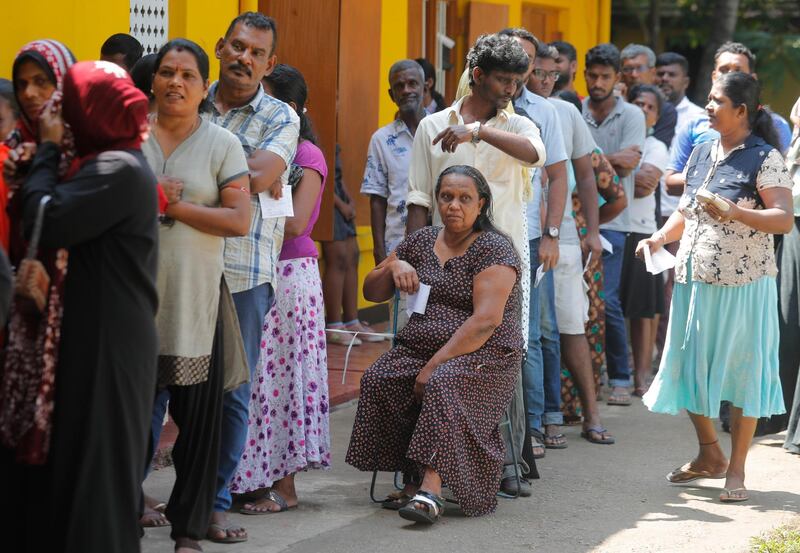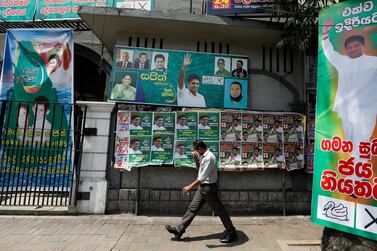Buses taking Muslims to vote in Sri Lanka's presidential election were shot at and pelted with stones on Saturday, in an attack seen as an attempt to intimidate the minority community from casting ballots in what is expected to be tight race.
Sri Lankans were voting for the first time since the Easter Day bombings at churches and hotels that killed 269 people and were later claimed by ISIS.
One of the leading candidates, the former defence secretary Gotabaya Rajapaksa who oversaw the military defeat of Tamil separatists 10 years ago, has vowed to overhaul national security, playing on the fears of the Sinhalese Buddhists majority following the April 21 attacks.
Mr Gotabaya's main challenger in the field of 35 candidates is Sajith Premadasa, the current housing minister, who has focused on social issues such as providing free housing, school uniforms for students and sanitary pads for women.
Long queues of voters formed early in Colombo and elsewhere and six hours into the voting, nearly 60 per cent had cast their votes, said Manjula Gajanayake, the national co-ordinator at the non-government Centre for Monitoring Election Violence.
About 16 million out of Sri Lanka's population of 22 million were eligible to vote in the election. Results are expected on Sunday.
Mr Gajanayake said and the attack on Muslim voters in north-west Sri Lanka was "definitely political elements trying to prevent voting".
The attackers placed burning tyres on the road and set up roadblocks before opening fire and and throwing stones at two vehicles in the convoy of more than 100 buses taking people to their home district to vote, police said.
Mr Gajanayake said no one was hurt in the attack and the voters had been able to exercise their franchise.
In the Tamil-dominated northern peninsula of Jaffna, police said they arrested 10 men they suspected of "trying to create trouble". There were also complaints that the army had illegally set up roadblocks that could stop people getting to polling stations.
Support from the minority Tamil and Muslim populations, who together form about 25 per cent of the country’s population, are seen as crucial to Mr Premadasa's election hopes. While Muslims fear an increase in the hostility they have faced since the Easter attacks, Tamils accuse Mr Rajapaksa and his brother, former president Mahinda Rajapaksa, of ignoring widespread human rights violations during a brutal military offensive to end the 26-year separatist insurgency in 2009.
As defence secretary, Mr Rajapaksa effectively ran the security forces and was accused of overseeing "death squads" that eliminated political rivals, journalists and others. He denies the allegations.
The outcome of the vote has wider regional implications. Sri Lanka has become an important arena of influence between regional heavyweights India and China. The country moved closer to China during Mahinda Rajapaksa's presidency from 2005 to 2015, but both Gotabaya Rajapaksa and Mr Premadasa have said they will strive for balance in Sri Lanka's ties with both countries.
The winner will preside over a country where economic growth has slowed to a more than five-year low of 1.6 per cent in the quarter ending in June, and which has a debt level of about 83 per cent of GDP.
“If Gotabaya wins he will improve the country. Otherwise the country will go down further,” said Manel Perera, 68, a housewife in the capital, Colombo.
Rajive Premathilake, 54, a business executive who said he voted for Mr Premadasa, said the next government needs to ensure “democracy, freedom and civil liberties while getting the economy going. It can’t be one at the expense of the other.”
But for Dammika, a voter in Colombo "national security matters above everything else, after those bomb attacks".







